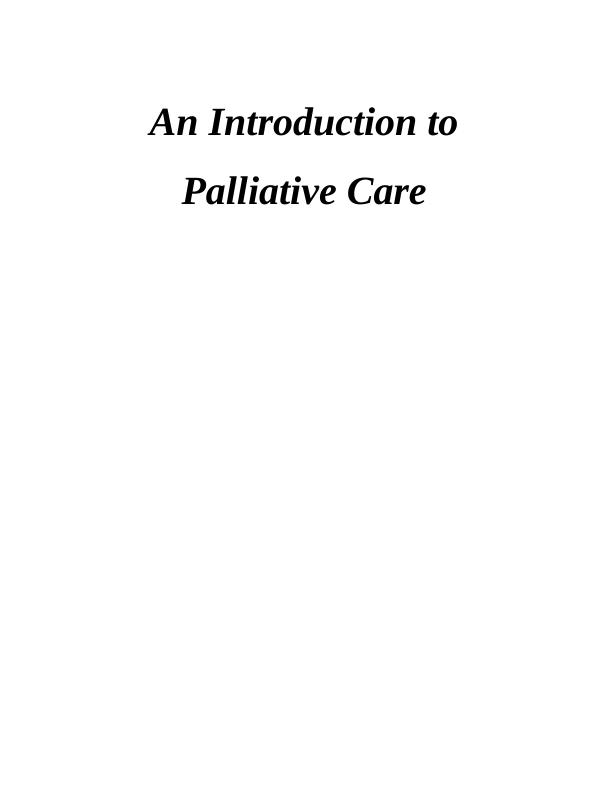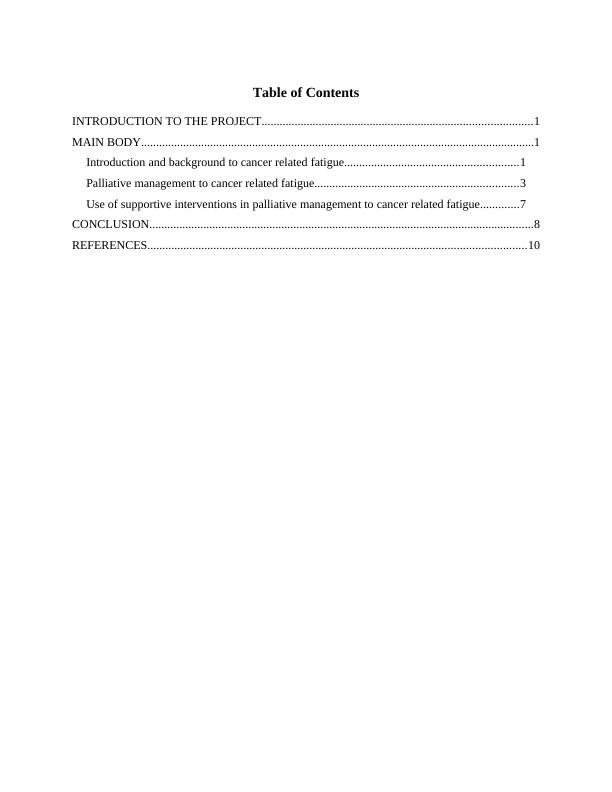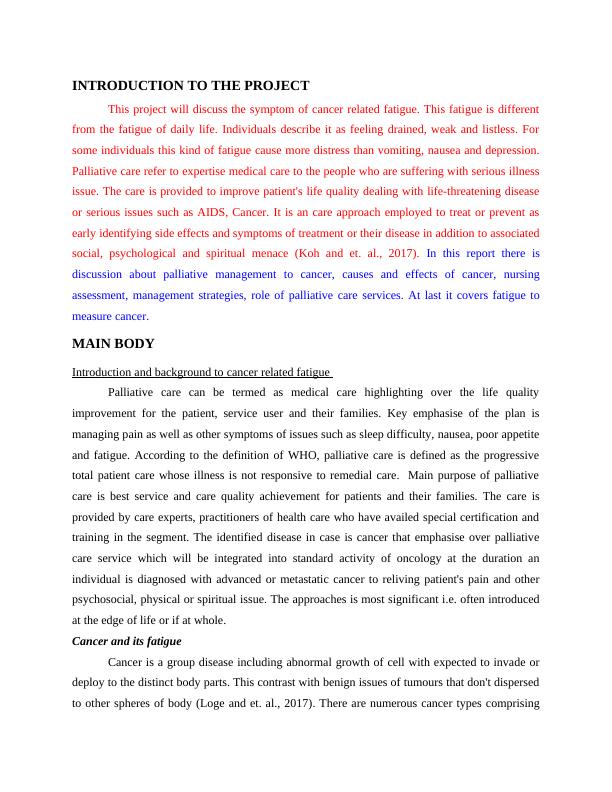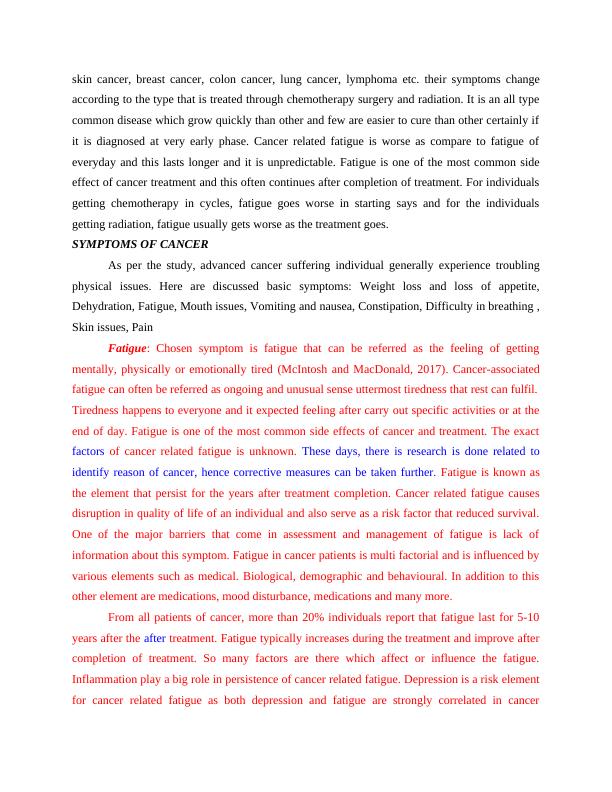An Introduction to Palliative Care
12 Pages4063 Words430 Views
Added on 2020-10-05
An Introduction to Palliative Care
Added on 2020-10-05
ShareRelated Documents
An Introduction toPalliative Care

Table of ContentsINTRODUCTION TO THE PROJECT..........................................................................................1MAIN BODY...................................................................................................................................1Introduction and background to cancer related fatigue..........................................................1Palliative management to cancer related fatigue....................................................................3Use of supportive interventions in palliative management to cancer related fatigue.............7CONCLUSION................................................................................................................................8REFERENCES..............................................................................................................................10

INTRODUCTION TO THE PROJECTThis project will discuss the symptom of cancer related fatigue. This fatigue is differentfrom the fatigue of daily life. Individuals describe it as feeling drained, weak and listless. Forsome individuals this kind of fatigue cause more distress than vomiting, nausea and depression.Palliative care refer to expertise medical care to the people who are suffering with serious illnessissue. The care is provided to improve patient's life quality dealing with life-threatening diseaseor serious issues such as AIDS, Cancer. It is an care approach employed to treat or prevent asearly identifying side effects and symptoms of treatment or their disease in addition to associatedsocial, psychological and spiritual menace (Koh and et. al., 2017). In this report there isdiscussion about palliative management to cancer, causes and effects of cancer, nursingassessment, management strategies, role of palliative care services. At last it covers fatigue tomeasure cancer. MAIN BODYIntroduction and background to cancer related fatigue Palliative care can be termed as medical care highlighting over the life qualityimprovement for the patient, service user and their families. Key emphasise of the plan ismanaging pain as well as other symptoms of issues such as sleep difficulty, nausea, poor appetiteand fatigue. According to the definition of WHO, palliative care is defined as the progressivetotal patient care whose illness is not responsive to remedial care. Main purpose of palliativecare is best service and care quality achievement for patients and their families. The care isprovided by care experts, practitioners of health care who have availed special certification andtraining in the segment. The identified disease in case is cancer that emphasise over palliativecare service which will be integrated into standard activity of oncology at the duration anindividual is diagnosed with advanced or metastatic cancer to reliving patient's pain and otherpsychosocial, physical or spiritual issue. The approaches is most significant i.e. often introducedat the edge of life or if at whole. Cancer and its fatigue Cancer is a group disease including abnormal growth of cell with expected to invade ordeploy to the distinct body parts. This contrast with benign issues of tumours that don't dispersedto other spheres of body (Loge and et. al., 2017). There are numerous cancer types comprising

skin cancer, breast cancer, colon cancer, lung cancer, lymphoma etc. their symptoms changeaccording to the type that is treated through chemotherapy surgery and radiation. It is an all typecommon disease which grow quickly than other and few are easier to cure than other certainly ifit is diagnosed at very early phase. Cancer related fatigue is worse as compare to fatigue ofeveryday and this lasts longer and it is unpredictable. Fatigue is one of the most common sideeffect of cancer treatment and this often continues after completion of treatment. For individualsgetting chemotherapy in cycles, fatigue goes worse in starting says and for the individualsgetting radiation, fatigue usually gets worse as the treatment goes. SYMPTOMS OF CANCERAs per the study, advanced cancer suffering individual generally experience troublingphysical issues. Here are discussed basic symptoms: Weight loss and loss of appetite,Dehydration, Fatigue, Mouth issues, Vomiting and nausea, Constipation, Difficulty in breathing ,Skin issues, PainFatigue: Chosen symptom is fatigue that can be referred as the feeling of gettingmentally, physically or emotionally tired (McIntosh and MacDonald, 2017). Cancer-associatedfatigue can often be referred as ongoing and unusual sense uttermost tiredness that rest can fulfil.Tiredness happens to everyone and it expected feeling after carry out specific activities or at theend of day. Fatigue is one of the most common side effects of cancer and treatment. The exactfactors of cancer related fatigue is unknown. These days, there is research is done related toidentify reason of cancer, hence corrective measures can be taken further. Fatigue is known asthe element that persist for the years after treatment completion. Cancer related fatigue causesdisruption in quality of life of an individual and also serve as a risk factor that reduced survival.One of the major barriers that come in assessment and management of fatigue is lack ofinformation about this symptom. Fatigue in cancer patients is multi factorial and is influenced byvarious elements such as medical. Biological, demographic and behavioural. In addition to thisother element are medications, mood disturbance, medications and many more. From all patients of cancer, more than 20% individuals report that fatigue last for 5-10years after the after treatment. Fatigue typically increases during the treatment and improve aftercompletion of treatment. So many factors are there which affect or influence the fatigue.Inflammation play a big role in persistence of cancer related fatigue. Depression is a risk elementfor cancer related fatigue as both depression and fatigue are strongly correlated in cancer

End of preview
Want to access all the pages? Upload your documents or become a member.
Related Documents
Palliative Care in Residential Aged Care: Improving End-of-Life Stage for Aging Australianslg...
|14
|3543
|469
An Introduction to Hospice and Palliative Carelg...
|12
|3046
|32
Palliative and Curative Care Assignmentlg...
|11
|2869
|27
Concept Analysis Template | Nursinglg...
|7
|1632
|11
Holistic Palliative Healthcarelg...
|7
|1897
|366
Palliative Care for COPD and Depressionlg...
|8
|2128
|34
